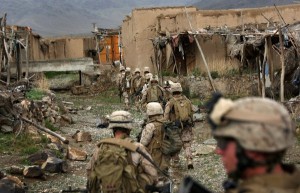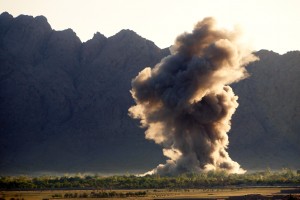Somali pirates recently hijacked a U.S.-flagged cargo ship with 20 Americans on board. Apparently the crew retook the vessel, but the pirates still have hostages in their custody along with a lifeboat that is out of fuel. In any case, the valuable information concerning Somali piracy has nothing to do with the specific details of this particular incident. The most interesting place to start is with a quick survey of the reactions across the web. As we survey the reactions, my hypothesis is that piracy exists because we want it to. But more on that later.
The involvement of Americans and a U.S.-flagged vessel brought much more attention to the issue of piracy than typically given to it in the past. Tigerhawk wants to know why the fact that it was a U.S.-flagged ship wasn’t enough deterrence and what Mr. Obama is going to do about the situation, even with the apparent self-rescue of the ship’s crew? Andrew Exum links the story without much to say, but stays devoted to his obsession with Special Operations Forces with his post title Calling all SEAL Teams.
The clearest prose comes from Galrahn at Information Dissemination, when he points out that Littoral Combat Ships are “terribly designed to fight pirates,” because “We fight pirates with boarding parties, which means sailors, and we fight war in the littorals with helicopters, and the LCS can only support 1 H-60.” Just so. Galrahn also has a very detailed post about the difficulty of fighting piracy in the Gulf of Aden given the hidden nature of the pirates. They never announce themselves as such until just in time to hijack a ship. Until then, there are merely fishermen. Galrahn’s post is required reading for everyone who wants to understand what we are and aren’t doing about piracy.
In the end, though, it isn’t quite as difficult as Galrahn makes it out to be, Tigerhawk comes too late to the discussion, and Andrew Exum’s idea to dispatch SEAL teams is absurd. The real problem is somewhat simpler and yet more difficult to solve.
There is nothing new about piracy in the Gulf of Aden, and we have been covering and commenting on it for at least six months. While The Captain’s Journal finds it very easy to criticize Mr. Obama, the issue of piracy didn’t begin with him, and although he could demonstrate strength and resolve and end it quickly – an unlikely exigency – President Bush didn’t do much to end the threat either.
Exum’s idea to dispatch Navy SEALS is simply silly, for at least (but not limited to) the following reasons: [a] Use of Navy SEALS who are experts in the use of Drager rebreathers and underwater demolitions is a terrible misuse of their forces, [b] they would have no platform from which to operate, and [c] there are far too many pirates for them, or another way of saying it is there aren’t nearly enough SEAL teams for the pirates.
Galrahn’s misgivings about the capabilities of the LCS to address piracy are spot-on, but his misgivings about our overall capability to deal with piracy is somewhat less accurate. The USS San Antonio did in fact have pirates in their possession before deploying back to the States after the 26th MEU. The USS Iwo Jima had LCACs, and this picture shows that it is easy enough to shoot from the sides of the LCAC.
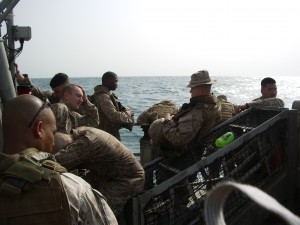
Marines qualify on the rifle with iron sights at 500 yards, so they could have easily handled pirates from an LCAC. The USS Iwo Jima and San Antonio both had helicopters, including the CH-46 shown here training with the 26th MEU.
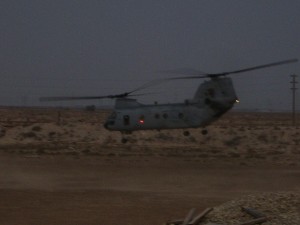
Colonel Desens observes that even with the advent of the V-22 Osprey, the CH-46 will be in service for many years to come. “The CH-46 is a proven technology. It is one of the most reliable aircraft in the inventory. It is stable and provides the perfect platform for things like fastroping, which will be problematical with the Osprey. Also, it is metal. Which means if it gets shot full of holes it is an easy fix, while the MV-22 will not be so easy.”
And so Colonel Desens gives us another means of delivering Marines to pirates: fastroping from the CH-46. There is also the CH-53 Super Stallion.
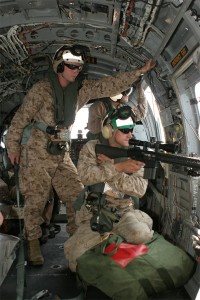
In fact, I had a chance to talk extensively with one Marine who had pirates in the sights of his Sasser .50 caliber rifle while on board a CH-53. “Did you take the shot,” I asked him? “No,” he answered. “RoE. Who wants to have lawyers put him in jail when he gets back to the States?”
From Harrier VTOL aircraft, to CH-46s (and fastroping), to CH-53s, to LCACs, and then to actually landing on the shores of Somalia to hunt down pirate domiciles (assuming good intelligence), there is almost no end to the possible tools that could have been used to perform counterpiracy operations with the 26th MEU and Fifth Fleet.
But it requires commitment, time and resources, and in the end, turning them over to a Kenyan court is no deterrence at all. Somalian pirates don’t fear the Kenyans, and as proven today, they don’t fear Americans either. The missing piece is what we do with pirates, and Galrahn mentions that “The current policy driving strategy, specifically the policy driving RoE, is clearly inadequate to solving the piracy problem off Somalia.”
And thus has he finally driven to the root of the problem. As we have discussed before, three analysts – including The Captain’s Journal – have given us the solution.
The Captain’s Journal has weighed in saying:
This is easy. We tell the LOAC and ROE lawyers that they’re special and that they should go to their rooms and write high-sounding platitudes about compassion in war so that they’re out of the way, we land the Marines on the ship, and we kill every last pirate. Then we hunt down his domiciles in Somali and destroy them, and then we find his financiers and buyers and kill them. Regardless of the unfortunate potential loss of Ukrainian or Russian civilian life upon assaulting the ship, this weaponry and ordnance should never have been shipped in this part of the world without escort (and perhaps it shouldn’t have been shipped even with escort). Negotiations will only serve to confirm the pirates in their methods. It’s killing time. It’s time to turn the United States Marines loose.
Ralph Peters has weighed in saying:
Piracy must be exterminated. Pirates aren’t folk heroes or champions of the oppressed. They’re terrorists and violent criminals whose ransom demands start at a million bucks. And they’re not impressed by the prospect of trials in a velvet-gloved Western court. The response to piracy must be the same as it was when the British brought an end to the profession’s “golden age:” Sink them or board them, kill them or hang them.
Lt. Col. P at OpFor has weighed in saying:
Kill all of the pirates.
Seriously. Why do we allow a handful of khat-addled assholes to dominate one of the world’s most important sea lanes? We, the western powers, have sufficient naval units in the area to take care of the problem in very quick order. What we lack is the will. We apply an idiotically high standard of judicial due process to a situation that doesn’t lend itself well to a judicial solution. Anyone who has dealt with Somalis can tell you that they laugh at western legalisms, and what they perceive as western weaknesses. And then they redouble their violent efforts to take what they want from you. They do react very well to a boot on their necks, and a gun to their heads. Then they tend to wise up quickly.
Here’s how it needs to be done. Oil tanker sends distress call, takes evasive actions insofar as it is capable. (Or better yet, armed men aboard oil tanker defend by fire.) Coalition forces despatch (sic) vessels and boarding parties. Pirates who survive ensuing gun battle are lined up by the rail and shot in the head, then dumped overboard. Pirate boats are burned. If their bases or villages on the coast can be identified, said bases are raided and destroyed. No fuss no muss, no ransom, no hostages, no skyrocketing costs.
Contra Exum, cloak and dagger raids with concealed results aren’t the order of the day. This all needs to be very open and public, with video of our actions. Sure, if we line up surviving pirates at the rail, shoot them in the head and dump the bodies overboard, the world will go into a fit, the lawyers would scream … and the piracy would end.
So we must consider which is the more humane and civilized way to deal with piracy: continuing to allow them free reign over the Gulf of Aden, or ending the problem quickly with hard actions. In the end, this isn’t for purposes of shock and the counsel given above is serious. We must decide, for there isn’t an easy alternative within the existing RoE to deal with piracy.
We may not want to deal with piracy this way, but this only shows that we want piracy more than we want the solution. Piracy exists because we want it to.
